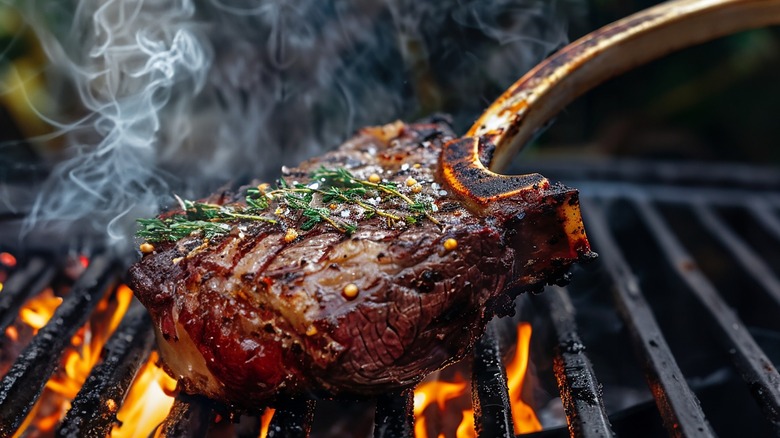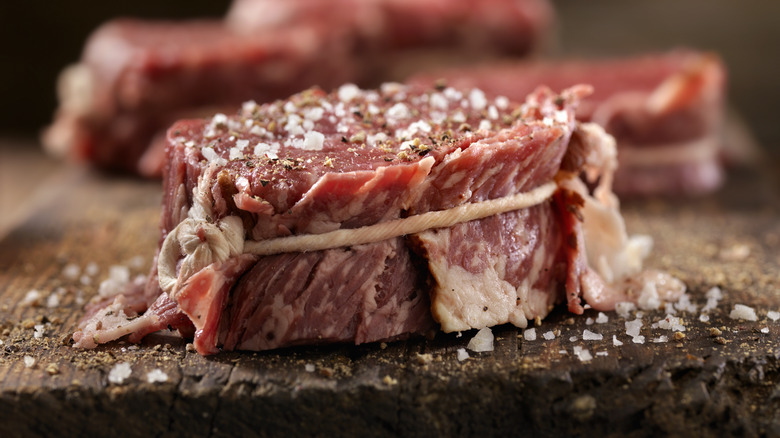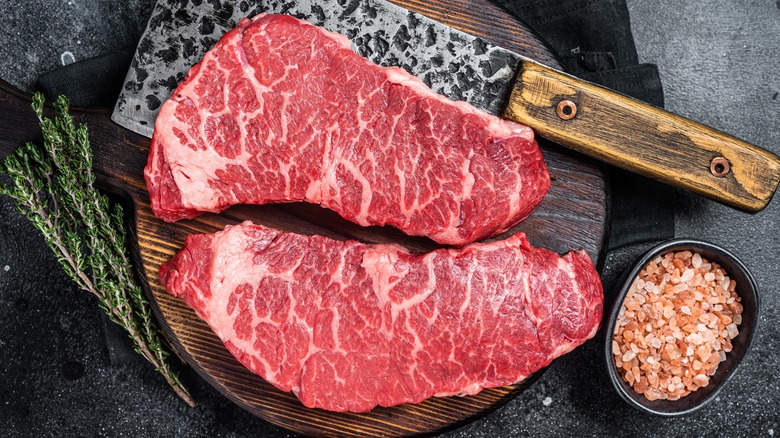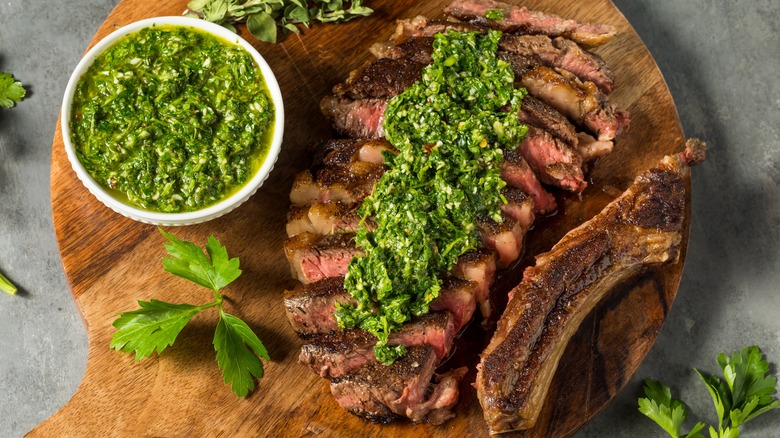Here's When To Season A Steak Before Grilling
There are a lot of factors involved when prepping your own steak, like how to properly sear a steak and which steak cuts are the easiest to cook at home. There's another important aspect to consider, and that's when and how to season it during the cooking process.
Seasoning your steak can be as simple as using just salt and nothing else (which I tend to do when cooking higher-grade cuts of meat like Wagyu), or you can go in another direction and use something unique like bouillon to season your steak. But the timing is key. That's because the length of time that salt is left on your steak can make a big difference in the way the end product turns out.
We asked K.C. Gulbro, chef and owner of restaurants FoxFire and Copper Fox, about when he seasons his steaks with salt. Gulbro says, "At home, I prefer to take the steaks out and sprinkle them with salt at least 30 minutes to one hour before cooking. At the restaurant, we will salt the steaks to order, but we try to bring them to the proper temperature (about 5 to 10 minutes) and then season them before grilling (5 minutes) so that the heat of the grill doesn't shock them."
You can, however, season your steak much earlier than that, up to 24 hours in advance, using a method called dry brining. Dry brining has some flavorful benefits, and it's something you can easily do at home, provided you plan ahead.
What seasoning your steak in advance does
Seasoning your steak a whole night in advance might seem like extra work for something you pretty much throw on a grill, cast iron pan, or carbon steel skillet, but there's a reason why this works to improve the flavor of your meat. That's because there are processes at work that not only season the exterior of the steak, but its interior as well.
Chef K.C. Gulbro says, "You can season beef in advance, but the timing depends on the cut. Some cuts need only an hour or so, while others can be seasoned up to 24 hours before cooking; this is known as dry brining."
Dry brining is simply a term for salting your food and letting it rest for a period of time before cooking it. After seasoning, the salt will first draw moisture out to the meat's surface. If you observe your steak a few minutes after you salt it, you'll notice that its surface has gone from a relatively dry appearance to a slightly wet one, as the salt draws out moisture. That moisture will then dissolve the salt on the steak, turning that liquid into a brine which will eventually break down the muscle proteins in the meat, which draws the salty moisture back in, seasoning the meat from the inside out.
Salting your meat immediately before cooking works too
Even though I've spent most of my career writing about food, I am admittedly pretty lazy. Do I always feel like planning ahead when eating something simple like steak? No. If I happen to find a piece of steak that's on monster sale at the store that day, I'll usually cook it for dinner that night, probably with some store-bought sides.
That's why salting it immediately before cooking is perfectly good too. Thickness is important here, however. Thin steaks don't need much seasoning, otherwise they get too salty to enjoy properly, says K.C. Gulbro. "Be careful with thinner cuts not to over-season or leave the seasoning on for too long, as this can dry out the meat and alter the flavor and texture."
In terms of amounts, one general rule of thumb is using 5 grams of kosher salt per pound to practice with (please invest in a kitchen scale, everyone), and once you get the hang of the way that looks, you can eyeball the amount of salt you use in the future. Salting immediately before you cook might not season the steak's interior, but each bite will still be seasoned properly overall. Besides, there's always stuff like A.1. Sauce if you need a little extra help in the flavor department.
What you season your steak with depends on what you're cooking
While salt should generally be your starting point with steak, sometimes a little extra flavor doesn't hurt. That's why K.C. Gulbro prefers kosher salt, freshly cracked black pepper, and garlic for his grilling needs. Though I generally favor salt and pepper alone, rubs like the Loud Mouth Mmmm Baby! all-purpose seasoning are starting to grow on me for cheap steak; we also recommend Cavender's Steak Seasoning.
You might want to consider a little bit of coordination to ensure a cohesive meal, which is why Gulbro says, "The choice of seasoning depends on the dish being prepared. For roasting or sautéing, we like to incorporate fresh rosemary and thyme. I also like to adjust ingredients based on the culture. For Latin dishes, I use cumin, coriander, and oregano, for Italian dishes, basil, oregano, parsley."
Though steak seems like a relatively straightforward thing to master, there are a lot of nuances to consider to get the best out of yours. Now that your toolkit is outfitted with proper seasoning techniques, go forth and get the most mileage you can out of that slab of red meat while it's still grilling season.



